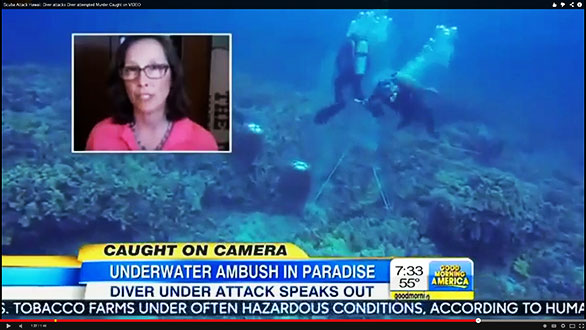
Hawaii’s aquarium fishing controversies became national news when anti-fishing activist Rene Umberger says she was attacked by diver Jay Lovell who was legally collecting Yellow Tangs. Screen image from CBS Good Morning America.
Underwater altercation when fish collector and group of anti-aquarium activists meet goes to trial
Earlier this week, aquarium fisherman Jay Lovell pleaded not guilty in Hawaii to charges of “terroristic threatening” in a widely publicized altercation between Lovell and anti-aquarium activist Rene Umberger. Umberger was representing the Sea Shepherd Conservation Society in mid-May of this year when she and several other anti-aquarium activists approached Lovell and his partner, Tyron Terazano, who were fishing a West Hawaii reef in roughly 15.25 meters (50 feet) of water. Lovell’s response to the approaching Sea Shepherd divers was caught on several video cameras and clearly showed Lovell rushing Umberger and knocking the scuba regulator from her mouth. What was not seen clearly in the video is what Kenneth Lawson, Associate Faculty Specialist in criminal law at the University of Hawaii’s William S. Richardson School of Law, thinks will be central to the defense’s case.
“If I was representing the defendant,” says Lawson, who actively practiced criminal law for 18 years, “I would argue that he felt threatened by her.”
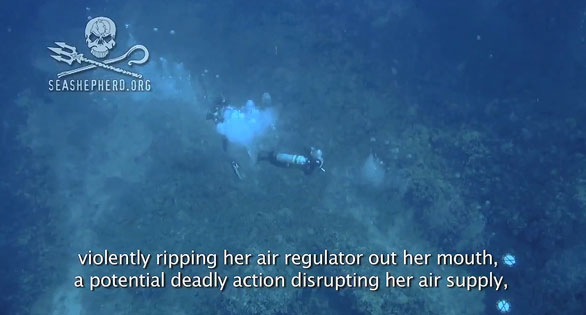
Jay Lovell rips at Rene Umberger’s air supply, releasing a burst of bubbles. His lawyer says he was acting in self-defense. Image: Sea Shepherd Society.org
Fear on Both Sides?
In fact Lovell and other aquarium fishermen in West Hawaii say they did—and continue to—feel threatened by Sea Shepherd operating in the area. They say their fear is based in large part on the activist organization’s well-publicized aggressive and sometimes violent actions in other campaigns. Sea Shepherd has a history of “direct action” tactics against fishermen and sea hunters, and it is best known for the weekly cable television series Whale Wars that premiered in 2008. Among the tactics it has used are damaging, disabling and sinking fishing vessels, throwing bottles of acid into whaling boats and aiming laser beams in the eyes of fishermen.
Hawaii aquarium fisher’s fear of Sea Shepherd was bolstered when Umberger, in a talk last June at the Donkey Mill Art Center in Holualoa, a village in Hawaii’s Kona coffee country, allegedly told the audience that Hawaiian anti-trade activist like herself were going to “sic Sea Shepherd” on the aquarium fishers.
Sea Shepherd launched its Hawaii anti-aquarium fishery campaign in the spring of 2013 despite claims of aquarium fishery sustainability strongly supported by the State, peer-reviewed data and the scientific literature. While anti-trade activists argued that aquarium fishers were destroying the islands’ reefs, Hawaii’s own Department of Aquatic Resources which tracks populations of marine organisms for the state government, testified that there was no evidence to support claims that fishing was driving reef species to extinction.
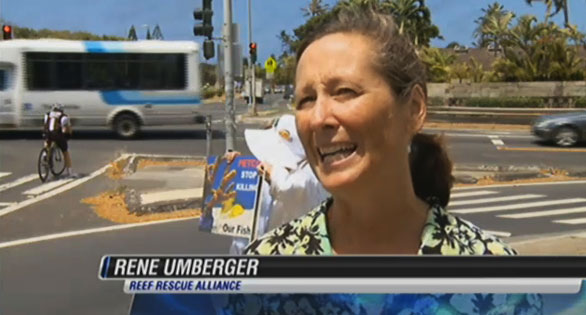
In a street protest in 2012, Rene Umberger called for an end to the aquarium trade. Aquarium fishermen say have been complaining about harassment by activists for some time. Hawaii News Now.
Terroristic Threatening
The incident that lead to charges being brought against Lovell occurred in early May 2014. Lovell is reported to have also filed a complaint against Umberger. After an investigation, Lovell was charged with “terroristic threatening” in late July. A trial is now scheduled to begin on September 11th.
In the United States, “terroristic” is a loaded word following the 2001 attacks on the Twin Towers, but Lawson points out that “terroristic threatening” is more akin to “menacing.”
“[Terroristic threatening] basically says that you put the other person in terror and fear that you’re going to cause them harm,” he says.
Umberger, an experienced diver, quickly recovered her air supply but maintains that a less experienced diver may not have been so lucky. A Sea Shepherd spokesperson stated in a press release, “A far less accomplished diver may not have survived.”
Jay Lovell, through his brother Jim, says that he was taken by surprise while working with his nets near the bottom and looked up to see that a group of six divers were fast approaching him. When Lovell and his partner had anchored in the spot they were fishing, Lovell says, they were the only boat and only divers in the area.
In an interview with CORAL Magazine back in May, Lovell’s brother said Jay Lovell “panicked because he was scared.” Jim Lovell continues, “[Jay] went over and knocked the regulator out of the mouth of the closest person to try to diffuse the situation.” Whether or not that defense will hold up in court when Umberger is clearly the one physically attacked in the video remains to be seen.
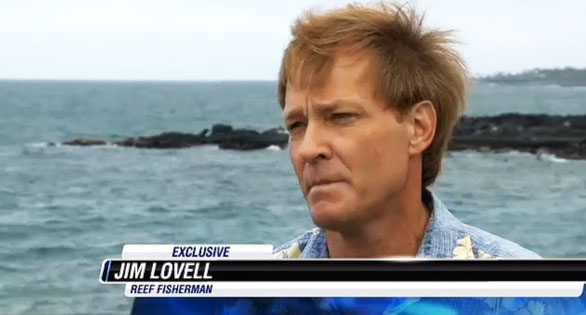
Fisherman Jim Lovell, brother Jay Lovell, claiming that fishermen were afraid of violent tactics used by Sea Shepherd in their Whale Wars confrontations. Screen image: Hawaii News Now.
A Reasonable Argument?
“In his defense,” conjectures Lawson, “the argument would be, ‘I could have really tried to harm her, but my intent was just to take off her mask—it was not to cause any harm. The intent was to get her to leave the area so I would not be in fear of whatever she was there to do. I tried to signal to her to leave me alone—I tried to do all these other things and she just continued to stalk me. And so I didn’t know what else to do—I didn’t want to physically assault her, I just tried to remove her mask so she would leave the area.’” Lawson says that under those circumstances, he thinks the argument could be reasonable to a jury.
From the prosecution’s standpoint, however, Lawson points out that, while Sea Shepherd’s tactics are aggressive, the ocean is still a free place. Lawson thinks the prosecution might argue, “The ocean is free for me to be in, and I’m not physically touching you and I’m keeping at least a few feet away. I have a legal right to be where I was, and you had no legal right to put your hands on me or touch me.” Lawson likens it to cases with the Paparazzi.
“It’s going to be that kind of back-and-forth,” Lawson says, “and it will be an interesting case to watch.”
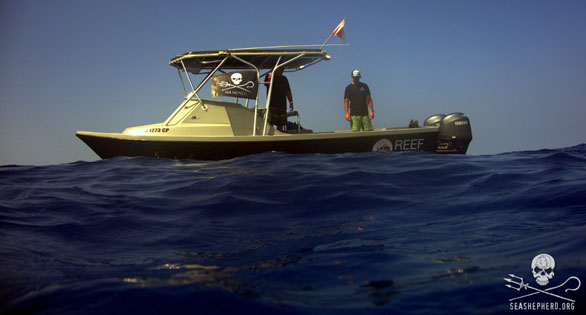
The Sea Shepherd boat used by Rene Umberger in looking for aquarium divers. Sea Shepherd is best known for its aggressive actions in the cable television series Whale Wars. Image: Sea Shepherd.org
The Story Beyond the Case
One of the biggest frustrations aquarium fishers in Hawaii express is their helplessness to combat what they say amounts to harassment. According to Jim Lovell, his brother Jay called from his boat as soon as possible after the incident to complain of being harassed by the Sea Shepherd boat and divers. “We have been asking for help for over one year,” says Jim Lovell regarding harassment allegations.
Most agree that being harassed doesn’t justify a physical attack, but the larger question remains about what constitutes harassment and how it should be handled. Any diver swimming as close to working fishermen as Umberger did at the time of this incident would undoubtedly interfere with fishing, which is a legal, permitted activity.
In a prior attempt to bring charges of harassment against an anti-trade activist, the charges were dropped because, according to state law, there is no regulation in place specifically against harassment of ocean fishing. While Hawaii has a provision for bringing harassment charges against an individual interfering with freshwater fishing, at this time, marine fishers have no such explicit protection.
Sea Shepherd maintains they were not harassing Lovell or intervening in any way. Paul Watson, founder and head of the Sea Shepherd Conservation Society, told CORAL back in May that Sea Shepherd is not a “protest organization.”
“We don’t actually intervene unless it’s illegal,” he said, “So I think that what you’re seeing [in Hawaii] is an investigation, but there wasn’t any intervention…. We’re not going to be interfering with any legal fishing operation.”
Perhaps a resolution regarding what harassment and intervention is and how it is handled will be a positive outcome of this truly unfortunate case.
References
Sea Shepherd: http://en.wikipedia.org/wiki/Sea_Shepherd_Conservation_Society
Reef Confrontation Report, CORAL, May 19, 2014 by Ret Talbot





Jim is raping the reefs, Sea Shepherd was simply documenting it. He is blatantly guilty of attempted murder.
Rape huh…..
Way to minimize the violent acts suffered by women over the years John.
Hate women much?
Additionally, Hawaiian Aquarium Fish collectors captured a pair of extremely rare Genicanthus personatus angels, (a Hawaiian endemic, the Masked Angelfish), and promptly handed them over to a breeder who has done the unthinkable, and managed to breed them and rear the larva and get them through meta and into the juvenile stage. They are now 6 months old.
Here is a story about the incredible process:
http://www.reef2rainforest.com/2014/08/30/karen-brittains-success-breeding-genicanthus-personatus-the-masked-angelfish/
In the past few years, the aquarium hobby has dramatically increased the number of captive bred fish, read about the rising tide project to learn more.
So it appears that the aquarium hobby is actually helping to save the planet, instead of “raping the reef”.
Hawaii has really done a poor job of controlling both sides fair and equally. These so called “protectors of the reef” are aggressive, start fights ,and are down right asking for confrontation from what I have seen and experienced.
Save the whale,save the sea potato,save the tata’s– give me a break will ya…… this woman was obviously harrassing a man trying to make a living legally. I would have been scared to look up and see a bunch of wack jobs coming for me also.